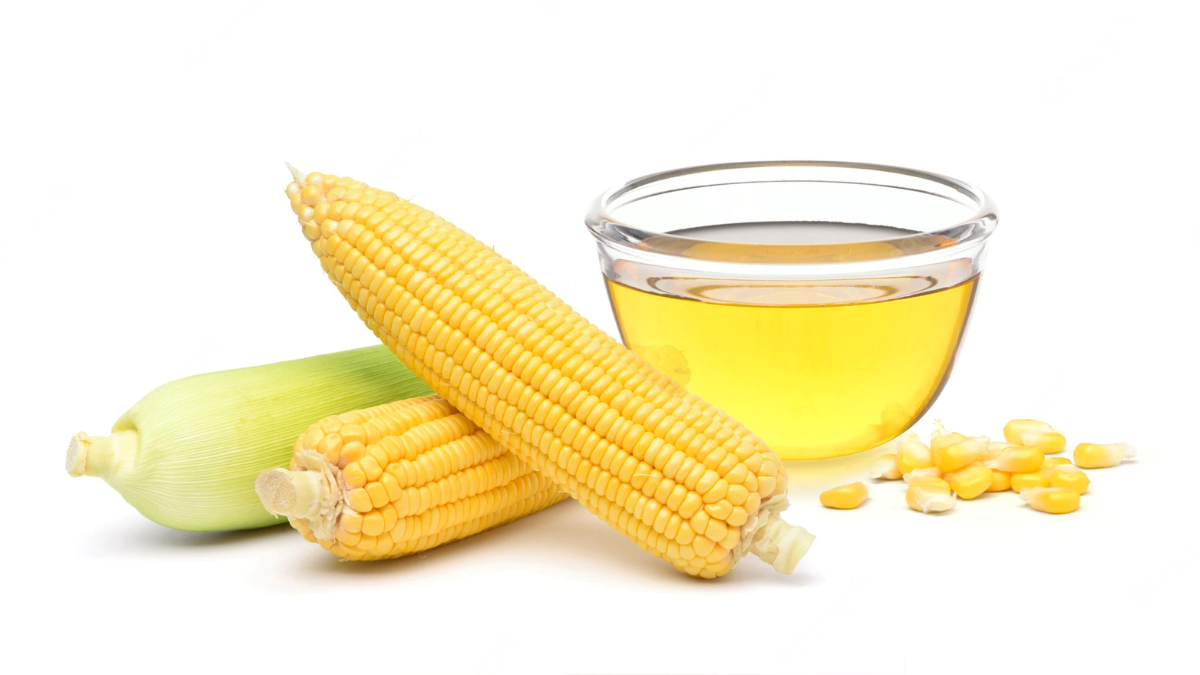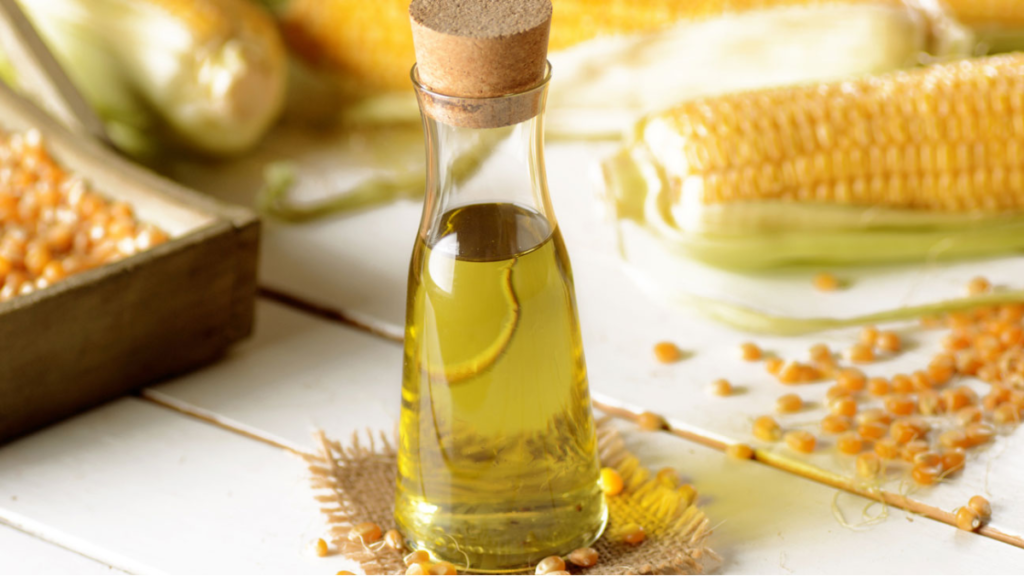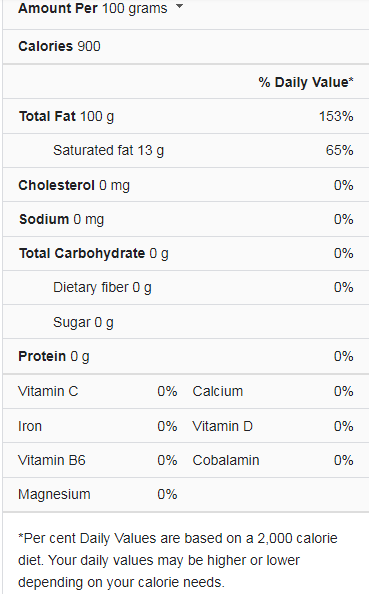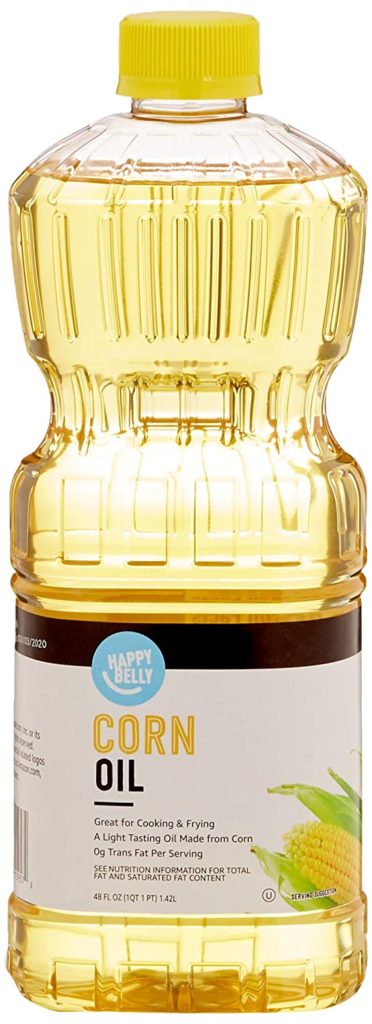A refined vegetable oil called corn oil is often used in cooking, especially deep frying. Along with many other uses, it is frequently used in industrial applications or as a cosmetic component. Corn must go through a protracted refining process to generate corn oil. Not all of the unique properties this process gives the oil are helpful, but many are.
Maize oil can minimize oxidative stress, limit allergic reactions, reduce inflammation, lower “bad” cholesterol, protect the skin, and enhance visual health and its many other benefits. However, some negative aspects, like potential toxicity, weight gain, and higher cancer risk, can be considered. On some of these negative consequences, your choice of corn oil and how it was produced from the maize itself may have a significant bearing.
What is Corn Oil?
One of the most frequently cultivated and used crops in the world, corn is used to make corn oil. It may be one of the most affordable vegetable oils due to its wide availability, making it one of the most well-liked. Corn oil can be obtained through a protracted process of steam distillation, refining, and expeller pressing. While this may produce oil with a very high smoke point, making it perfect for frying, it can also remove many healthy chemicals, meaning there may be few health advantages.
Choose cold-pressed versions of maize oil marked as organic or unrefined if you want to reap the benefits of utilizing it. Although they might have a lower smoke point, they may also contain the monounsaturated and polyunsaturated fats responsible for many of the health advantages of corn oil. However, even the unprocessed form of this oil may be much higher in fat and calories than many other vegetable oils, such as olive or almond oil, and may be less healthful.
Corn Oil Nutrition Facts
Health Benefits of Corn Oil
Due to its relatively neutral flavor and lower price than other vegetable oils, corn oil is mostly used as cooking oil. However, some people use organic corn oil for massages, topical treatments, and medical purposes. The oil’s origin and processing technique affect its health effects. Unrefined, organic oil may have some advantages, as discussed below.
Could Maintain Cholesterol Levels
The body needs monounsaturated and polyunsaturated fats to reduce cholesterol levels and inflammation. However, these fats could not be balanced in most maize oil variations, especially refined ones. Use this oil cautiously while cooking because it can lower blood pressure and balance cholesterol in very small amounts.
May Lessen Inflammation
When taken in moderation, omega-3 and omega-6 may be known to reduce inflammation in the body. Along with headaches, stomach issues, and even inflammatory skin disorders, this can ease the symptoms of arthritis.
May Enhance Vision Health
In addition to lipids, corn oil may contain additional components, including flavonoids and antioxidants like lutein, that might lessen the body’s production of free radicals. In particular, lutein may be able to safeguard eye health and stop the onset of cataracts.
Possibly Prevents Chronic Illnesses
Flavonoids, vitamin E, monounsaturated fats, and polyunsaturated fats may have antioxidant characteristics that can lessen oxidative stress throughout the body. This oil can help the skin appear and feel younger and prevent chronic disease when taken in moderation.
Could lessen Allergies
Some of the constituents in maize oil may have been known to lessen the body’s response to allergens, easing rhinitis and asthma symptoms. Although maize oil is rarely used as a topical oil, it may improve allergic symptoms when applied directly to the skin.
Help with Skin Care
The antioxidants and tocopherols in maize oil may help prevent skin infections and soothe irritation, acne, eczema, and psoriasis, whether you apply it directly to your skin or ingest little amounts of it. No matter how nice it makes your skin seem, remember that this oil can be highly heavy in fat and should always be eaten in moderation! Even the appearance of wrinkles and other age spots can be lessened with its aid.
Potentially High in Phytosterols
Because phytosterols, a substance with a cholesterol-lowering effect, are present, there may be a significant decrease in cholesterol absorption.
What is Corn Oil Best Used for?
Because it is so widely available, corn has long been the most popular vegetable oil in the United States. It’s mellow, almost buttery flavor is popular among cooks for use in mayonnaise and baking (think cornbread). Because it gives meals a unique roasty flavor, it is popular for pan frying. There are many applications for corn oil inside and outside the kitchen. It is used to manufacture fuel for gasoline- and diesel-powered engines, as well as an industrial cleaner and lubricant. Additionally, it’s an ingredient in many shampoos, liquid soaps, and cosmetics. However, its primary use is as a frying oil.
Fish can be cooked in medium- and high-oleic sunflower oils, which hold up well to high temperatures and frequently. Vegetable oils include corn oil, which has a high smoke point (about 450 ) like most other vegetable oils. It works well for both shallow and deep frying in a skillet. Corn oil has a mild flavor, so it doesn’t flavor food like olive oil. Both soybean and safflower oils have unusually high smoke values and are flavorless. Both grapeseed oil and corn oil are suitable alternatives.
Is Corn Oil Good for the Heart?
According to the USDA, monounsaturated fatty acids make up nearly 4 grams, or more than 25%, of the total fats in maize oil. According to the American Heart Association, eating meals high in these MUFAs is one of the finest things you can do for your heart. Corn oil may reduce heart disease risk since it contains healthy ingredients like vitamin E, linoleic acid, and phytosterols. Powerful antioxidant vitamin E may protect your heart and blood vessels from oxidative damage brought on by too many free radicals.
In response to inflammation, the cholesterol particles accumulate, eventually clog your arteries and cause heart disease. For this reason, you shouldn’t use maize oil when cooking. It’s one of the worst things you can do for your heart, even though it’s marketed as “heart healthy.”The director of formulations for SYSTEM and a licensed dietitian also pointed out that corn oil is not as healthful as one might believe. It contains many polyunsaturated fatty acids, such as Omega-6, which can harm the liver and induce inflammation.
Which is Better, Vegetable or Corn Oil?
With 62 percent of the cholesterol-lowering monounsaturated fat and only 7 percent of the artery-clogging saturated fat, canola-based vegetable oils are the best choice for optimal health. Corn oil is a form of vegetable oil, a general word for oil derived from plants. Soybean oil, canola oil, or a combination of numerous vegetable oils are frequently found in bottles labeled “vegetable oil.”It is frequently recommended in recipes where oil is a listed ingredient but is not supposed to change the final product’s flavor.
Mazola Corn Oil is a heart-healthy cooking oil in addition to its outstanding culinary advantages. Because the oil can be heated to a fairly high temperature without burning, it is also often used for frying meals. However, you can typically replace corn with another flavorless vegetable oil. Corn oil has no cholesterol by nature! By using vegetable oils like MazolaCorn Oil for cooking oils with greater saturated fat content, you can aid in enhancing heart health.
Is Corn Oil Good for Diabetics?
Monounsaturated oils should be a part of any at-home diabetes treatment plan because they raise the body’s healthy cholesterol level. Sunflower, safflower, corn, sesame, soybean, and other plant materials make polyunsaturated oils, which are also liquid fats at room temperature. Although corn oil has certain beneficial properties, such as phytosterols and vitamin E, it is not generally regarded as a healthy fat. This is due to the food’s high levels of inflammatory omega-6 fats, which should be restricted in a typical Western diet. It is also extremely processed.
One medium sweet corn cob boiled for 20 minutes has a glycemic index of 48 and a glycemic load of 8. These figures come from the University of Sydney Glycemic Index. There are 16 grams of carbohydrates in all. Both the glycemic load and index of corn are low. Although corn will increase blood sugar levels, it won’t spike them. Sugar is added to the highly processed white flour used to make white bread. White bread should be substituted with whole grain or 100% whole wheat bread, according to the American Diabetes Association.
Conclusion
Corn oil is produced using the corn germ (maize). Most uses for refined maize oil are in the kitchen, where its high smoke point makes it a superior frying oil. Most maize oil is extracted by expeller pressing; then, it is extracted using methyl pentane or hexane as a solvent. It is also an essential part of many kinds of margarine. Corn oil frequently costs cheaper than the bulk of other vegetable oils. Corn oil is another kind of feedstock for biodiesel. Maize oil is also used to manufacture soap, salve, paint, pencils, erasers, inks, fabrics, nitroglycerin, and pesticides, among other things. It is occasionally used as a drug molecule carrier in pharmaceutical formulations.
The solvent is removed from the maize oil and then recovered and used once more. After extraction, the maize oil is refined by degumming and alkali treatment, which removes phosphatides. Alkali treatment also removes color and neutralizes free fatty acids (bleaching). The last steps in refining are winterization (the removal of waxes) and deodorization by steam distillation of the oil. Some specialty oil producers create unrefined, 100% expeller-pressed maize oil. This product is more expensive since it has a lower yield and a smaller market share than the combined expeller and solvent process.




